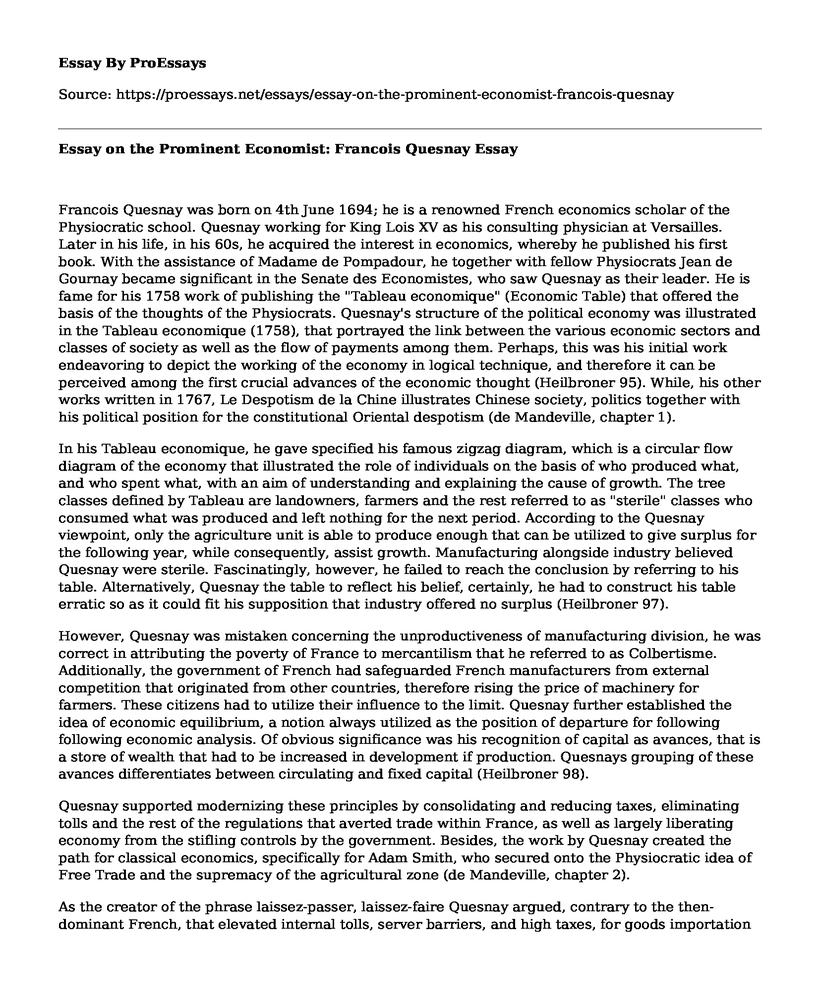Francois Quesnay was born on 4th June 1694; he is a renowned French economics scholar of the Physiocratic school. Quesnay working for King Lois XV as his consulting physician at Versailles. Later in his life, in his 60s, he acquired the interest in economics, whereby he published his first book. With the assistance of Madame de Pompadour, he together with fellow Physiocrats Jean de Gournay became significant in the Senate des Economistes, who saw Quesnay as their leader. He is fame for his 1758 work of publishing the "Tableau economique" (Economic Table) that offered the basis of the thoughts of the Physiocrats. Quesnay's structure of the political economy was illustrated in the Tableau economique (1758), that portrayed the link between the various economic sectors and classes of society as well as the flow of payments among them. Perhaps, this was his initial work endeavoring to depict the working of the economy in logical technique, and therefore it can be perceived among the first crucial advances of the economic thought (Heilbroner 95). While, his other works written in 1767, Le Despotism de la Chine illustrates Chinese society, politics together with his political position for the constitutional Oriental despotism (de Mandeville, chapter 1).
In his Tableau economique, he gave specified his famous zigzag diagram, which is a circular flow diagram of the economy that illustrated the role of individuals on the basis of who produced what, and who spent what, with an aim of understanding and explaining the cause of growth. The tree classes defined by Tableau are landowners, farmers and the rest referred to as "sterile" classes who consumed what was produced and left nothing for the next period. According to the Quesnay viewpoint, only the agriculture unit is able to produce enough that can be utilized to give surplus for the following year, while consequently, assist growth. Manufacturing alongside industry believed Quesnay were sterile. Fascinatingly, however, he failed to reach the conclusion by referring to his table. Alternatively, Quesnay the table to reflect his belief, certainly, he had to construct his table erratic so as it could fit his supposition that industry offered no surplus (Heilbroner 97).
However, Quesnay was mistaken concerning the unproductiveness of manufacturing division, he was correct in attributing the poverty of France to mercantilism that he referred to as Colbertisme. Additionally, the government of French had safeguarded French manufacturers from external competition that originated from other countries, therefore rising the price of machinery for farmers. These citizens had to utilize their influence to the limit. Quesnay further established the idea of economic equilibrium, a notion always utilized as the position of departure for following following economic analysis. Of obvious significance was his recognition of capital as avances, that is a store of wealth that had to be increased in development if production. Quesnays grouping of these avances differentiates between circulating and fixed capital (Heilbroner 98).
Quesnay supported modernizing these principles by consolidating and reducing taxes, eliminating tolls and the rest of the regulations that averted trade within France, as well as largely liberating economy from the stifling controls by the government. Besides, the work by Quesnay created the path for classical economics, specifically for Adam Smith, who secured onto the Physiocratic idea of Free Trade and the supremacy of the agricultural zone (de Mandeville, chapter 2).
As the creator of the phrase laissez-passer, laissez-faire Quesnay argued, contrary to the then-dominant French, that elevated internal tolls, server barriers, and high taxes, for goods importation were the causes of the earsplitting French poverty he observed around him. Quesnay advocated King Louis XV (1715 1774) to liberalize trade as well as slashing tax in order for the French to begin to emulate wealthier Britain. The Quesnays methodology of physiocrats system together with the principle of rule rose from a thrilling sort of the principle of natural law, that he considered signified the exquisitely selected economic order. Quesnay was, for sure among the few originator of the 19th century harmony of class interests alongside associated policy that greatest social satisfaction happened under free competition (Heilbroner 100).
In his Tableau economique manuscript, Quesnay supported that, neither industry nor trade was the source of wealth, and alternatively contends that agricultural surpluses, by running through the economy in the terms of wages, rent and purchases were explicit economic movers, for the two aims. Firstly, directive obstructs the flow of income through the entire society classes together with the economic development. Secondly, taxes on the productive classes like farmers should be lessened with regards to the high taxes for unproductive classes like the landowners, because their luxurious lifestyle deforms the income flow (Heilbroner 101).
The Tableau illustrates the reason for the Physiocrats disagreement with Cantillon concerning food exporting. As Quesnay's model had various restrictions, he acknowledged that idealized "natural" system is mot aligned with reality, and therefore the government needs to remove restrictions facilitating for the natural economic order to emerge (de Mandeville, chapter 3).
Works Cited
de Mandeville, B. (1724). The fable of the bees.
Heilbroner, Robert L. "The Worldly Philosophers." The Great Economic Thinkers (1955), pp.95-102
Cite this page
Essay on the Prominent Economist: Francois Quesnay. (2021, Jun 18). Retrieved from https://proessays.net/essays/essay-on-the-prominent-economist-francois-quesnay
If you are the original author of this essay and no longer wish to have it published on the ProEssays website, please click below to request its removal:
- Essay Example: Antitrust Legislation
- Is Blockchain Living Up to the Hype? - Article Analysis Essay
- Essay on Derived and Fluctuating Demand and Buying Centers
- Essay on Globalism & Globalization: Exploring Benefits in Modern World
- Essay on Entrepreneurship: Key to Global Economic Development Post-2008 Crisis
- Essay Example on Increase in Chronic Diseases: Employer Wellness Programs to the Rescue
- Research Paper Sample on Employment Law Issues







